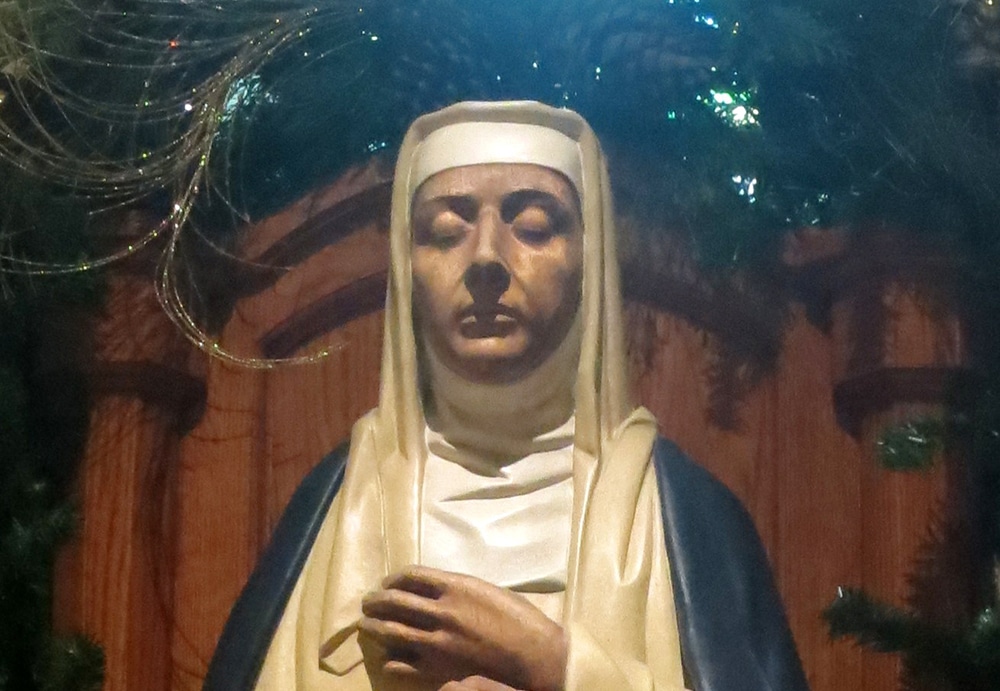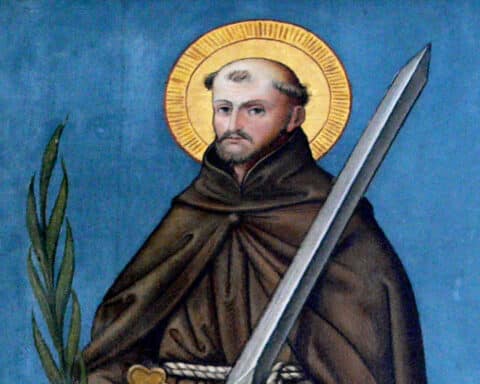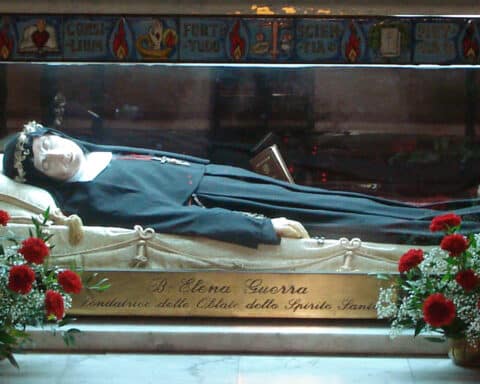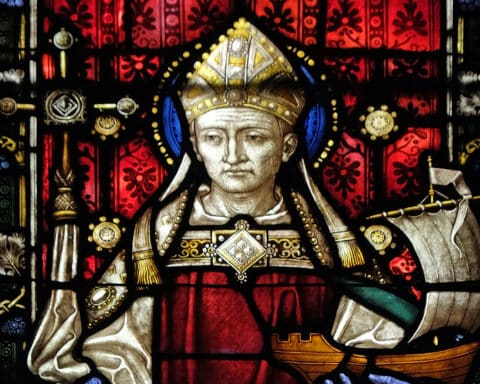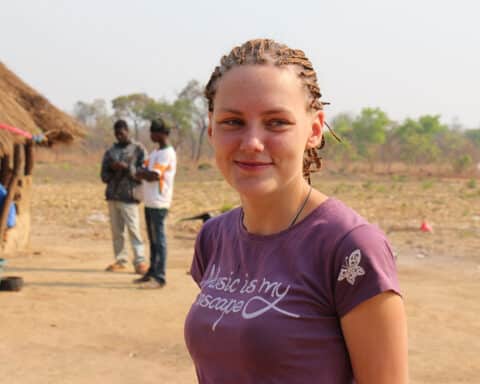“One thing I know, Lizzy,” the girl I nannied once remarked to me, “is that things are never boring when you’re around.” At the young age of 7, this child was impeccably perceptive. I came into this world with plenty of surprises, the most critical being the golf ball-sized lesion in my spine (the giant freckle on my chin being a close second). My spina bifida went undetected on ultrasounds, so this diagnosis came as a shock to my parents at my birth. Mere hours later, I was whisked away into an operating room to undergo spinal closure surgery.
Regarding unanticipated health issues, the story of my birth can be likened to that of St. Margaret of Castello, whom the pope declared a saint on April 24 by using a process known as “equipollent” canonization. She was born in Metola, Italy to noble parents who wanted a son. When Margaret was born not only a girl, but also with disabilities such as blindness and spinal injuries, her parents were horrified. Tragically, their shame of having a disabled child moved them to reject her, keeping her hidden away in a secluded part of their home. She was forbidden from exiting, living in secret so her family need not acknowledge the child they did not want.
At age 16, her parents brought her to a shrine in Castello in hopes that she would undergo a miraculous healing. When it was apparent that no healing had occurred, her parents abandoned her. One day while begging on the streets, she encountered a community of lay Dominicans who took her in. She became an advocate for the poor, the imprisoned and those with disabilities. In a holy paradox, despite having been rejected by her own parents, St. Margaret was known by her love. She was so beloved by her community that the entire town attended her funeral, inspired by the motherly care she showed to all.
A beautiful story though it is, the experiences that led St. Margaret to sainthood are heart-wrenching nonetheless. Although child abuse carries a stigma nowadays, and abusers are more likely to suffer consequences, the ableism that informed Margaret’s parents’ unspeakable behavior is alive and well today. Many people who are born with disabilities undergo emotional rejection by their parents, causing them to feel they will never be fully accepted by their parents, or even that their disability makes them a failure.
Thankfully, this is not the case for everyone. I am tremendously blessed to have parents who, throughout my tumultuous life with health issues, welcomed me with open arms and ensured I did not feel excluded from our family. However, cultural notions regarding disability made it nearly impossible for me to avoid developing harmful ideas about my worth. As a child, I felt no sense of belonging with my able-bodied peers. While my classmates spent their school breaks on tropical vacations, I spent mine out of town for doctor appointments. Even my friends sometimes made me feel excluded for the way I walked, all the surgeries I required, all the school days I missed because I was sick. I felt I was seen as little more than a medical nuisance. Meanwhile, my parents attempted to find a place for our family in local spina bifida communities, but on grounds of not being “disabled enough” according to the other children I met, I was not accepted there, either.
Though I was not physically enclosed as St. Margaret was, for many years I tried to hide my health issues away. I wanted to be known as a singer, writer, a curly redhead, a lover of life. “The girl with spina bifida” was the last thing I wanted to be known for, because surely that made me less lovable. I could not hide my unusual gait, but felt that if I accentuated my traits that I deemed desirable, I could compensate for the ways my spina bifida made me undesirable.
I knew refusing to embrace my spina bifida was harmful to me. I knew who I was at my core; I was simply afraid of her. At the time, I had no confidant who understood the complexity of my situation. I had no footsteps in which to follow, no legacy to carry on of a disabled woman who was boldly and authentically herself. So, I became her.
Amidst feelings of loneliness, I had one person who knew me in a way no one else did; someone who saw me at my weakest but knew me by my strength. Dr. Doug Koontz is the neurosurgeon who performed my spinal closure 12 hours after I was born, a surgery for babies born with spina bifida that greatly increases a baby’s chance of survival by reducing the risk of infection. Had I been born mere decades earlier, before this surgery was practiced, I almost certainly would not be here today as a 22-year-old woman.
Through his expertise, Dr. Koontz preserved my vulnerable life. Less than two years later, he moved back to his home state of Oklahoma (500 miles from my home in Iowa) to be closer to family. Due to my young age, I was unable to recall memories of him, but as I grew up, my parents told me of his compassion and calmness in the face of uncertainty. This brought them, especially my mother, immense peace and trust in Dr. Koontz’s ability to help me. Despite growing up without him in my life, knowing his tender care for me fostered a feeling of emotional connection to him. Along with this feeling came a restlessness that could only be resolved by reaching out to him, and thanking him for saving my life.
Many tears and rough drafts later, I wrote him a letter expressing everything I wanted him to know. I told him about the physical and emotional struggles I had endured throughout my life, how grateful I was for his compassion toward my family, and how ardently I desired to know him. I mailed it off, prayed and waited.
A few months later, I received the loveliest response from Dr. Koontz, who expressed gratitude for my effort in reaching out. Months passed by, and on a sweltering hot Texas day in July, my lifelong desire to meet him was fulfilled. Countless tears, sadness, joy and deepest gratitude were shed during our meeting. At last, I felt permanent, tangible freedom from the girl who despised her body, who feared the prospect of being seen for who she truly was, and whose expectations for herself were irreconcilable with her God-given worth. That day invigorated my desire to become the woman I always longed to be — one who loves bravely, passionately, wholeheartedly. Like St. Margaret, I strive to live out a holy paradox: to recall the experiences where I have felt unloved and allow them to strengthen my desire to love wholly.
As someone whose livelihood is affected by ableism, it is tempting to immediately condemn parents such as those of St. Margaret. After all, they rejected their own child for circumstances she could not control, all for the sake of their own image. However, it is imperative to acknowledge the power of fear in the human heart, and to remember that fear is at the core of bigotry. Fear is a visceral, highly potent emotion with the capability to distort our perception of our life’s purpose. We fear losing what belongs to us, the control we think we have, and the peace we spend our whole lives seeking.
In some cases, fear moves us to dehumanize others, because it is easier to deem another human being a threat than it is to embrace them as a brother or sister. We desire worthiness, and so our pride tries to persuade us that we can find worth in demeaning the worth of others. We fear because we long to love and be loved, but in fearing all that does not serve us, we hinder ourselves from experiencing either of these in full. In my young life, I have encountered ableism in some of its ugliest forms, but I have also encountered its glorious antithesis, which is love without fear.
In a culture whose individualism continues to infiltrate the heart of society, now is the time to strive for a love that is greater than anything one can accomplish alone. Dr. Koontz, whom I now consider a beloved friend, lives out this call by giving people, especially the most vulnerable, the opportunity to live a beautiful life. No matter who we are, we all share in this responsibility: to counter the fear-induced sin of ableism by upholding the dignity of disabled people, proclaiming that no human being should be hidden, and should instead be uplifted as a vital member of society.
As we work for a more Christ-like Church and world, may we always be willing to sacrifice our comfort for the causes of truth, beauty and goodness. May we, in the spirit of St. Margaret, choose to love bravely.
Lizzy Grace Dowd writes from Iowa.

